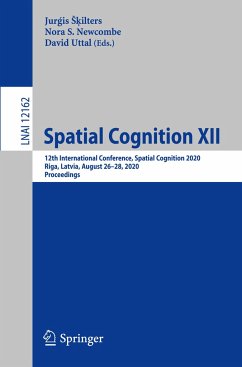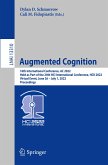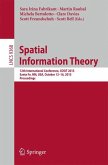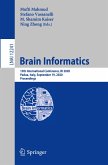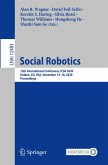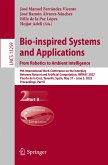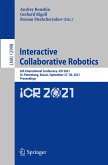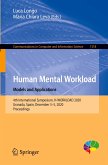Spatial Cognition XII
12th International Conference, Spatial Cognition 2020, Riga, Latvia, August 26-28, 2020, Proceedings
Herausgegeben:S_ilters, Jur_is; Newcombe, Nora S.; Uttal, David
Spatial Cognition XII
12th International Conference, Spatial Cognition 2020, Riga, Latvia, August 26-28, 2020, Proceedings
Herausgegeben:S_ilters, Jur_is; Newcombe, Nora S.; Uttal, David
- Broschiertes Buch
- Merkliste
- Auf die Merkliste
- Bewerten Bewerten
- Teilen
- Produkt teilen
- Produkterinnerung
- Produkterinnerung
This book constitutes the thoroughly refereed proceedings of the 12th International Conference, Spatial Cognition 2020, held in Riga, Latvia, in September 2020. The physical event was postponed to 2021 due to the COVID-19 pandemic.
The 19 full papers and 6 short papers presented in this book were carefully selected and reviewed from 50 submissions. They focus on the following topics: spatial representation and cognitive maps; navigation and wayfinding; spatial representation in language, logic, and narrative; and spatial abilities and learning.
Andere Kunden interessierten sich auch für
![Augmented Cognition Augmented Cognition]() Augmented Cognition64,99 €
Augmented Cognition64,99 €![Spatial Information Theory Spatial Information Theory]() Spatial Information Theory38,99 €
Spatial Information Theory38,99 €![Brain Informatics Brain Informatics]() Brain Informatics38,99 €
Brain Informatics38,99 €![Social Robotics Social Robotics]() Social Robotics75,99 €
Social Robotics75,99 €![Bio-inspired Systems and Applications: from Robotics to Ambient Intelligence Bio-inspired Systems and Applications: from Robotics to Ambient Intelligence]() Bio-inspired Systems and Applications: from Robotics to Ambient Intelligence67,99 €
Bio-inspired Systems and Applications: from Robotics to Ambient Intelligence67,99 €![Interactive Collaborative Robotics Interactive Collaborative Robotics]() Interactive Collaborative Robotics49,99 €
Interactive Collaborative Robotics49,99 €![Human Mental Workload: Models and Applications Human Mental Workload: Models and Applications]() Human Mental Workload: Models and Applications38,99 €
Human Mental Workload: Models and Applications38,99 €-
-
-
This book constitutes the thoroughly refereed proceedings of the 12th International Conference, Spatial Cognition 2020, held in Riga, Latvia, in September 2020. The physical event was postponed to 2021 due to the COVID-19 pandemic.
The 19 full papers and 6 short papers presented in this book were carefully selected and reviewed from 50 submissions. They focus on the following topics: spatial representation and cognitive maps; navigation and wayfinding; spatial representation in language, logic, and narrative; and spatial abilities and learning.
The 19 full papers and 6 short papers presented in this book were carefully selected and reviewed from 50 submissions. They focus on the following topics: spatial representation and cognitive maps; navigation and wayfinding; spatial representation in language, logic, and narrative; and spatial abilities and learning.
Produktdetails
- Produktdetails
- Lecture Notes in Computer Science 12162
- Verlag: Springer / Springer International Publishing / Springer, Berlin
- Artikelnr. des Verlages: 978-3-030-57982-1
- 1st ed. 2020
- Seitenzahl: 348
- Erscheinungstermin: 20. August 2020
- Englisch
- Abmessung: 235mm x 155mm x 19mm
- Gewicht: 534g
- ISBN-13: 9783030579821
- ISBN-10: 3030579824
- Artikelnr.: 59856236
- Herstellerkennzeichnung
- Springer-Verlag GmbH
- Tiergartenstr. 17
- 69121 Heidelberg
- ProductSafety@springernature.com
- Lecture Notes in Computer Science 12162
- Verlag: Springer / Springer International Publishing / Springer, Berlin
- Artikelnr. des Verlages: 978-3-030-57982-1
- 1st ed. 2020
- Seitenzahl: 348
- Erscheinungstermin: 20. August 2020
- Englisch
- Abmessung: 235mm x 155mm x 19mm
- Gewicht: 534g
- ISBN-13: 9783030579821
- ISBN-10: 3030579824
- Artikelnr.: 59856236
- Herstellerkennzeichnung
- Springer-Verlag GmbH
- Tiergartenstr. 17
- 69121 Heidelberg
- ProductSafety@springernature.com
Spatial representation and cognitive maps.- Dual Population Coding for Path Planning in Graphs with Overlapping Place Representations.- Dynamic Problem Solving in Space.- How to Model (Personalised) Landmarks?.- The Influence of Position on Spatial Representation in Working Memory.- Spatial Representation in Sequential Action Organization of Weakly Constrained Everyday Activities.- Understanding Cognitive Saliency by Using an Online game.- A Framework for Place-based Survey Implementation.- A Study on Visual and Structural Characteristics of Landmarks and Experts' and Non-experts' Evaluations.- Navigation and wayfinding.- Redefining Global and Local Landmarks: When Does a Landmark Stop Being Local and Become a Global One?.- Local Wayfinding Decisions in a Complex Real-World Building.- Developing a Replication of a Wayfinding Study. From a Large-scale Real Building to a Virtual Reality Simulation.- Investigation of Potential Cognition Factors Correlated to Fire Evacuation.- Comparing Human Wayfinding Behavior Between a Real, Existing Building, a Virtual Replica, and Two Architectural Redesigns.- Motion Features of Digital Path Tracing in Urban Map Navigation.- Investigating Wayfinding under Inconsistent Information.- Applying Psychophysics to Applied Spatial Cognition Research.- Spatial representation in language, logic, and narrative.- Spatial Descriptions on a Functional-geometric Spectrum: the Location of Objects.- Cross-linguistic Differences in Side Assignment to Objects and Interpretation of Spatial Relations: Right and Left in German and Italian.- Local Alignment of Frame of Reference Assignment in English and Swedish Dialogue.- A Logical Framework for Spatial Mental Models.- The Spatiotemporal Dimension of Singular Reference.- Spatial abilities and learning.- Minecraft as a Generative Platform for Analyzing and Practicing Spatial Reasoning.- ERMENTAL: A Simple Web Environment to Design and Teach the Effects ofCognitive Training Experiments.- The Function of Gesture in Architectural-Design-Related Spatial Ability.- Impacts of Scent on Mental Cutting Ability for Industrial and Engineering Technology Students as Measured through a Sectional View Drawing.
Spatial representation and cognitive maps.- Dual Population Coding for Path Planning in Graphs with Overlapping Place Representations.- Dynamic Problem Solving in Space.- How to Model (Personalised) Landmarks?.- The Influence of Position on Spatial Representation in Working Memory.- Spatial Representation in Sequential Action Organization of Weakly Constrained Everyday Activities.- Understanding Cognitive Saliency by Using an Online game.- A Framework for Place-based Survey Implementation.- A Study on Visual and Structural Characteristics of Landmarks and Experts' and Non-experts' Evaluations.- Navigation and wayfinding.- Redefining Global and Local Landmarks: When Does a Landmark Stop Being Local and Become a Global One?.- Local Wayfinding Decisions in a Complex Real-World Building.- Developing a Replication of a Wayfinding Study. From a Large-scale Real Building to a Virtual Reality Simulation.- Investigation of Potential Cognition Factors Correlated to Fire Evacuation.- Comparing Human Wayfinding Behavior Between a Real, Existing Building, a Virtual Replica, and Two Architectural Redesigns.- Motion Features of Digital Path Tracing in Urban Map Navigation.- Investigating Wayfinding under Inconsistent Information.- Applying Psychophysics to Applied Spatial Cognition Research.- Spatial representation in language, logic, and narrative.- Spatial Descriptions on a Functional-geometric Spectrum: the Location of Objects.- Cross-linguistic Differences in Side Assignment to Objects and Interpretation of Spatial Relations: Right and Left in German and Italian.- Local Alignment of Frame of Reference Assignment in English and Swedish Dialogue.- A Logical Framework for Spatial Mental Models.- The Spatiotemporal Dimension of Singular Reference.- Spatial abilities and learning.- Minecraft as a Generative Platform for Analyzing and Practicing Spatial Reasoning.- ERMENTAL: A Simple Web Environment to Design and Teach the Effects ofCognitive Training Experiments.- The Function of Gesture in Architectural-Design-Related Spatial Ability.- Impacts of Scent on Mental Cutting Ability for Industrial and Engineering Technology Students as Measured through a Sectional View Drawing.

